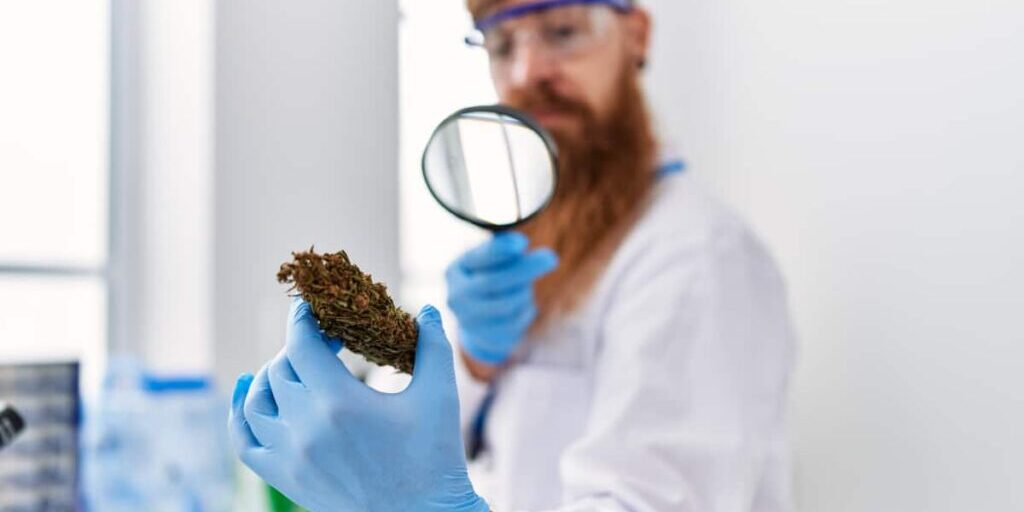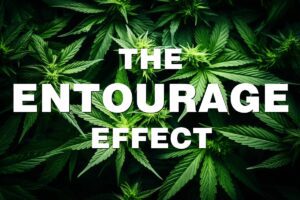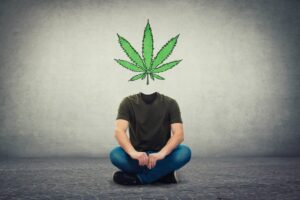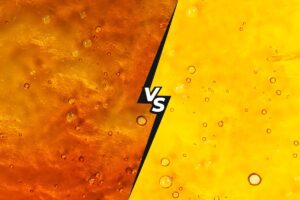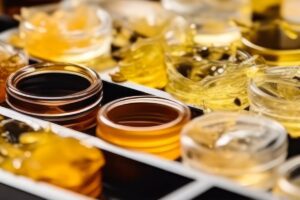First things first: Hemp (CBD) won’t ever get you high. But marijuana (THC) will.
Potential psychoactive effects from marijuana and THC are the main difference between hemp vs marijuana and CBD vs THC comparisons. It’s something everyone thinking about taking cannabis products should be aware of before beginning.
Let’s uncover why the two different varieties of Cannabis Sativa L. have opposite effects even though they come from the same plant species.
Night-and-day opposites
Cannabis plants — whether hemp or marijuana — produce special chemicals called cannabinoids. In the body, cannabinoid compounds act like tiny messengers that bind to receptor sites in the endocannabinoid system (ECS). The way you feel may change significantly depending on the cannabinoid you use. So, knowing the source of the cannabis sativa plants matters a lot.
Now for a closer look at why these different varieties of the same plant species have such radically different health effects and how to tell them apart.
What is hemp?
Hemp has a long history dating back to just after the last Ice Age. According to anthropological research, hemp cannabis was mainly used for cord, fiber, and its richly nutritious hemp seeds. Today, industrial hemp plants are used to make everything from natural medicines to nutritional supplements like hemp seed oil, biodegradable plastics, and even eco-friendly concrete-like building material!
Hemp plants mainly produce Cannabidiol, the active ingredient in CBD products like full spectrum CBD oil tinctures, distillate, and isolate. Hemp CBD is non-intoxicating and cannot make you feel “high” or “stoned” no matter how much you take.
Industrial hemp is unique among the different cannabis varieties because it produces almost no THC, the cannabinoid in marijuana that causes psychoactive effects. Dried hemp plants contain less than 0.3 percent THC on a dry-weight basis, so you can never get high no matter how much you use.
Hemp’s lack of psychoactivity is why it is now legalized in the United States and Puerto Rico.

RELATED: Compare CBD Oil vs Hemp Oil vs Hemp Seed Oil
What is marijuana?
It’s “the smoke of hell,” according to the infamous Reefer Madness cannabis propaganda campaign from the 1930s that stigmatized pot use. The “devil’s lettuce” looks unassumingly similar to its non-psychoactive hemp counterpart. But marijuana harbors a secret behind those innocent-looking leaves and wonderfully fragrant, sticky flowers. 😈
Marijuana is absolutely loaded with the psychoactive cannabinoid Tetrahydrocannabinol, or THC for short. Unlike hemp, which produces only the tiniest amounts of the psychoactive chemical, marijuana almost exclusively makes it. THC has therapeutic benefits similar to hemp products. However, the dose required to attain them often causes significant psychoactive side effects in users.
Many people seek marijuana because of its high THC content in the bud and flower. Depending on the THC:CBD ratio, it can offer varying degrees of psychoactive experiences that medical marijuana and recreational marijuana consumers love to enjoy.
Cannabis-derived products with more than 0.3 percent THC content are considered marijuana products in the United States, according to the 2018 Farm Bill. Check your local marijuana regulations if you plan on using products with high levels of THC to make sure you do so lawfully.
Marijuana’s psychoactive effects are the main reason it is against the law or otherwise stigmatized in most places around the world.

RELATED: Can CBD become addictive like THC can?
Are hemp and CBD the same thing?
Hemp is the whole plant — the leaves, stems, and flowers — and CBD is a natural medicine derived from the hemp flower called a cannabinoid.
CBD and THC are called major cannabinoids because they occur in the highest levels in hemp and marijuana respectively. Scientists have found over 100 cannabinoid compounds in their clinical research of cannabis plants.
What is CBD (Cannabidiol)?
CBD is a non-psychoactive compound that does not induce the high THC is so famous for. CBD brings a wide range of potential health benefits to the table and is not only known for aiding sleep and reducing anxiety but has been proven to hold anti-inflammatory properties. Any way you look at it, CBD has a lot of uses and the power to improve health and well-being for many people around the world.
What is THC (Tetrahydrocannabinol)?
THC’s claim to fame is its psychoactive properties. Some might call it infamous. Beyond the mind-altering effects and euphoria, medical cannabis use may help ease chronic pain, nausea, and poor appetite. But remember that excessive marijuana use may cause unpleasant side effects, including anxiety, paranoia, panic attacks, racing thoughts, and increased heart rate.
CBD vs THC: Comparison/Contrast
It’s no secret that CBD and THC are the two major players in the cannabis game. They both interact with the body’s endocannabinoid system but in their unique ways. According to one scientific study, combining CBD and THC may help to increase total CBD concentrations in the blood. Further research shows similar results when combining CBD and THC doses.
Minor cannabinoids and beyond
High-quality CBD extract offers so much more than just major cannabinoids! The real magic happens when all the natural cannabis plant medicines are combined.
True full spectrum CBD extract products like Cannabiva brand products contain lots of minor cannabinoids, including CBN, CBG, CBDV, CBL, and CBC. Cannabiva is also chockful of fragrant natural medicines called terpenes that researchers attribute potential benefits.
Some cannabis studies show that combining one cannabinoid compound with the others naturally occurring in cannabis amplifies health benefits. Scientists coined the term “entourage effect” to describe this natural phenomenon when they observed that full spectrum extracts produce more robust benefits than CBD isolate.
Discover the individual benefits of each cannabinoid compound derived from a rich cannabis plant extraction:
CBG (Cannabigerol)
CBG is a minor cannabinoid that’s earned the impressive title of the “Rolls Royce of Cannabinoids” because, like the elite car brand, it’s powerful but rare to find. Besides garnering that title, CBG is also known as the “Mother of All Cannabinoids” since it is a precursor compound to CBD and THC. CBG may help regulate mood balance, blood pressure, immune function, and pain tolerance. CBG may help regulate mood balance, blood pressure, immune function, and pain tolerance.

SHOWDOWN: Watch CBG go head-to-head with CBD
CBN (Cannabinol)
CBN is a byproduct of the natural breakdown of THC in the cannabis plant. Common uses for CBN include promoting nighttime sedative effects, relaxation, and improved sleep/wake rhythms. It’s thought that CBN may play a role in the sleep-inducing effect of specific cannabis strains with higher levels of it.
THCV (Tetrahydrocannabivarin)
Structurally similar to THC, this compound has the potential to suppress hunger and decrease appetite.
CBDV (Cannabidivarin)
CBDV has piqued people’s interest in neurology, as it may have some anticonvulsant effects.
Terpenes
Terpenes are aromatic molecules that give cannabis plant extracts a distinct scent and flavor. Cannabis terpenes are also under study for their therapeutic benefits.
Understanding the endocannabinoid system
Humans and animals have an intricate network of signaling systems in their bodies called the endocannabinoid system (ECS). The ECS and other related systems regulate vital physiological processes such as mood, appetite, sleep, and immune response.
In the body, the special cannabinoid medicines produced by cannabis plants bind to receptor sites in the ECS and those other signaling systems. The natural cannabis plant compounds tell your body to respond in different ways when they bind to these receptors. As a result, they help boost mood, soothe tension, reduce anxiety, promote pain relief, or trigger an anti-inflammatory effect.
There are two primary receptors in the ECS:
CB1 receptors
Cannabinoid receptor (CB) type one is predominantly found in the brain and spinal cord. CB1 receptors influence our neurological processes, including neurotransmitter production. Neurotransmitter balance affects the way we feel and how we perceive the world. THC primarily binds to CB1 receptors, which causes powerful psychoactive effects.
CB2 receptors
CB2 receptors are mostly found within the peripheral nervous system, particularly immune cells, and they play a part in the body’s natural healing ability, pain sensation, and inflammation response.
TRPV-1
CBD does not bind to the CB1 or CB2 receptor sites, which initially perplexed cannabis researchers. Instead, scientists found CBD binds to TRPV-1, a receptor the body uses to sense temperature and pain and respond to perceived injury. TRPV-1 may also modulate the release of neurotransmitters in the brain. Neurotransmitters like Serotonin and Dopamine regulate mood balance and emotional outlook.
The legality and current state of cannabis
The legal landscape surrounding cannabis has been in flux around the world for many years. In terms of the United States, the 2018 Farm Bill changed the legal definition to distinguish hemp, which is non-psychoactive, from marijuana, which is highly psychoactive. Hemp-derived CBD products containing less than 0.3 percent THC content are legal to buy in all 50 states and Puerto Rico.

RELATED: Is CBD Legal? CBD and Hemp Extract Laws
Marijuana legality is very much on a state-by-state basis. While some areas permit recreational use, others allow only medical use.
Final thoughts on hemp vs marijuana vs CBD vs THC
The world of cannabis is a fascinating place. New and exciting cannabis health benefits are being unveiled every day. With growing research and shifting cultural perspectives, state laws can change anytime. It’s advisable to stay current with the legal regulations within your local area and purchase products from reputable brands only.
Frequently Asked Questions About Hemp, Marijuana, CBD, and THC
Find answers to more frequently asked questions about the difference between hemp and marijuana below. Live chat with Cannabiva Wellness Advisors if you need answers to something we haven’t explored today.





